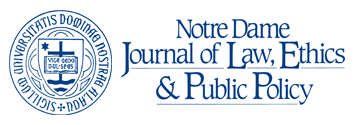Notre Dame Journal of Law, Ethics & Public Policy Online
Document Type
Article
Publication Date
2016
Abstract
Is the modern-day trial attorney or trial judge aware of the effects of digital isolation on the contemporary juror caused by court rules regulating the use or possession of digital devices by sitting jurors? This article will discuss how removing a juror’s smart phone (or device), or forbidding its possession or excessively controlling its use at any stage of jury service can have an unintended impact on jurors, affecting their understanding of the evidence, their deliberations, and ultimately their verdict. In the first part of this article, I will draw from the work of social scientists from a variety of disciplines, and illustrate the power of digital connection and disconnection on individuals and, specifically, sitting jurors. In the second part of this piece, I will review the existing literature on how federal and state courts, from a variety of jurisdictions, currently ban smart phone possession by jurors or greatly restrict their use. This section will also address how the Supreme Court has implicitly acknowledged that a juror’s smart device contains the individual narrative of his or her private life.5 In this article, I will argue how Riley v. California6 recognized the powerful expectation individuals have in maintaining control of the information in their phones, and how separating a juror from his or her device could promote extreme anxiety. In the third part of this article, I will comment on the need for the legal community as a whole to comprehend and prepare for the evolution of the modern digital juror and embrace a new model of juror empowerment. This preparation will require courts, scholars, and litigators to develop new and innovative methods of venire selection and case presentation, accommodating a whole generation of fact finders; a generation that has never known a life without the internet, social medial, or smart devices.
Recommended Citation
Brayer, Patrick C., "THE DISCONNECTED JUROR: SMART DEVICES AND JURIES IN THE DIGITAL AGE OF LITIGATION" (2016). Notre Dame Journal of Law, Ethics & Public Policy Online. 5.
https://scholarship.law.nd.edu/ndjlepp_online/5


